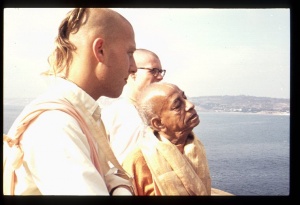SB 10.89.48-49: Difference between revisions
m (1 revision(s)) |
(Vanibot #0018 edit: make synonym terms in Sanskrit italic in SB - Vanisource) |
||
| Line 1: | Line 1: | ||
{{info | {{info | ||
|speaker= | |speaker=Śukadeva Gosvāmī | ||
|listener=King | |listener=King Parīkṣit | ||
}} | }} | ||
[[Category:Srimad-Bhagavatam - Canto 10 Chapter 89]] | |||
[[Category:Bhagavatam Verses Spoken by Sukadeva Gosvami - Vanisource|108948]] | |||
<div style="float:left">'''[[Srimad-Bhagavatam]] - [[SB 10|Tenth Canto]] - [[SB 10.89: Krsna and Arjuna Retrieve a Brahmana's Sons|Chapter 89: Kṛṣṇa and Arjuna Retrieve a Brāhmaṇa's Sons]]'''</div> | |||
<div style="float:right">[[File:Go-previous.png|link=SB 10.89.47]] '''[[SB 10.89.47]] - [[SB 10.89.50]]''' [[File:Go-next.png|link=SB 10.89.50]]</div> | |||
{{RandomImage}} | |||
{{SBnotice}} | |||
==== TEXTS 48-49 ==== | ==== TEXTS 48-49 ==== | ||
<div | <div class="verse"> | ||
tatrāśvāḥ śaibya-sugrīva- | :tatrāśvāḥ śaibya-sugrīva- | ||
meghapuṣpa-balāhakāḥ | :meghapuṣpa-balāhakāḥ | ||
tamasi bhraṣṭa-gatayo | :tamasi bhraṣṭa-gatayo | ||
babhūvur bharatarṣabha | :babhūvur bharatarṣabha | ||
tān dṛṣṭvā bhagavān kṛṣṇo | |||
mahā-yogeśvareśvaraḥ | :tān dṛṣṭvā bhagavān kṛṣṇo | ||
sahasrāditya-saṅkāśaṁ | :mahā-yogeśvareśvaraḥ | ||
sva-cakraṁ prāhiṇot puraḥ | :sahasrāditya-saṅkāśaṁ | ||
:sva-cakraṁ prāhiṇot puraḥ | |||
</div> | </div> | ||
| Line 21: | Line 27: | ||
==== SYNONYMS ==== | ==== SYNONYMS ==== | ||
<div | <div class="synonyms"> | ||
''tatra''—at that place; ''aśvāḥ''—the horses; ''śaibya-sugrīva-meghapuṣpa-balāhakāḥ''—named Śaibya, Sugrīva, Meghapuṣpa and Balāhaka; ''tamasi''—in the darkness; ''bhraṣṭa''—having lost; ''gatayaḥ''—their way; ''babhūvuḥ''—became; ''bharata-ṛṣabha''—O best of the Bhāratas; ''tān''—them; ''dṛṣṭvā''—seeing; ''bhagavān''—the Personality of Godhead; ''kṛṣṇaḥ''—Kṛṣṇa; ''mahā''—supreme; ''yoga-īśvara''—of masters of yoga; ''īśvaraḥ''—the master; ''sahasra''—a thousand; ''āditya''—suns; ''saṅkāśam''—comparable to; ''sva''—His personal; ''cakram''—disc weapon; ''prāhiṇot''—sent; ''puraḥ''—in front. | |||
</div> | </div> | ||
{{SBcollapse}} | |||
==== TRANSLATION ==== | ==== TRANSLATION ==== | ||
<div | <div class="translation"> | ||
In that darkness the chariot's horses—Śaibya, Sugrīva, Meghapuṣpa and Balāhaka—lost their way. Seeing them in this condition, O best of the Bhāratas, Lord Kṛṣṇa, the supreme master of all masters of yoga, sent His Sudarśana disc before the chariot. That disc shone like thousands of suns. | In that darkness the chariot's horses—Śaibya, Sugrīva, Meghapuṣpa and Balāhaka—lost their way. Seeing them in this condition, O best of the Bhāratas, Lord Kṛṣṇa, the supreme master of all masters of yoga, sent His Sudarśana disc before the chariot. That disc shone like thousands of suns. | ||
</div> | </div> | ||
| Line 35: | Line 41: | ||
==== PURPORT ==== | ==== PURPORT ==== | ||
<div | <div class="purport"> | ||
Śrīla Viśvanātha Cakravartī gives the following insight into this verse. Lord Kṛṣṇa's horses had descended from Vaikuṇṭha to participate in His earthly pastimes. Since the Lord Himself was pretending to be a finite human being, His steeds now acted confused to enhance the drama of the situation for all who would one day hear this pastime. | Śrīla Viśvanātha Cakravartī gives the following insight into this verse. Lord Kṛṣṇa's horses had descended from Vaikuṇṭha to participate in His earthly pastimes. Since the Lord Himself was pretending to be a finite human being, His steeds now acted confused to enhance the drama of the situation for all who would one day hear this pastime. | ||
</div> | </div> | ||
__NOTOC__ | </div> | ||
</div> | |||
<div style="float:right">[[File:Go-previous.png|link=SB 10.89.47]] '''[[SB 10.89.47]] - [[SB 10.89.50]]''' [[File:Go-next.png|link=SB 10.89.50]]</div> | |||
__NOTOC__ | |||
__NOEDITSECTION__ | |||
Revision as of 20:38, 1 December 2017

A.C. Bhaktivedanta Swami Prabhupada
Please note: The synonyms, translation and purport of this verse were composed by disciples of Śrīla Prabhupāda
TEXTS 48-49
- tatrāśvāḥ śaibya-sugrīva-
- meghapuṣpa-balāhakāḥ
- tamasi bhraṣṭa-gatayo
- babhūvur bharatarṣabha
- tān dṛṣṭvā bhagavān kṛṣṇo
- mahā-yogeśvareśvaraḥ
- sahasrāditya-saṅkāśaṁ
- sva-cakraṁ prāhiṇot puraḥ
SYNONYMS
tatra—at that place; aśvāḥ—the horses; śaibya-sugrīva-meghapuṣpa-balāhakāḥ—named Śaibya, Sugrīva, Meghapuṣpa and Balāhaka; tamasi—in the darkness; bhraṣṭa—having lost; gatayaḥ—their way; babhūvuḥ—became; bharata-ṛṣabha—O best of the Bhāratas; tān—them; dṛṣṭvā—seeing; bhagavān—the Personality of Godhead; kṛṣṇaḥ—Kṛṣṇa; mahā—supreme; yoga-īśvara—of masters of yoga; īśvaraḥ—the master; sahasra—a thousand; āditya—suns; saṅkāśam—comparable to; sva—His personal; cakram—disc weapon; prāhiṇot—sent; puraḥ—in front.
Translation and purport composed by disciples of Śrīla Prabhupāda
TRANSLATION
In that darkness the chariot's horses—Śaibya, Sugrīva, Meghapuṣpa and Balāhaka—lost their way. Seeing them in this condition, O best of the Bhāratas, Lord Kṛṣṇa, the supreme master of all masters of yoga, sent His Sudarśana disc before the chariot. That disc shone like thousands of suns.
PURPORT
Śrīla Viśvanātha Cakravartī gives the following insight into this verse. Lord Kṛṣṇa's horses had descended from Vaikuṇṭha to participate in His earthly pastimes. Since the Lord Himself was pretending to be a finite human being, His steeds now acted confused to enhance the drama of the situation for all who would one day hear this pastime.